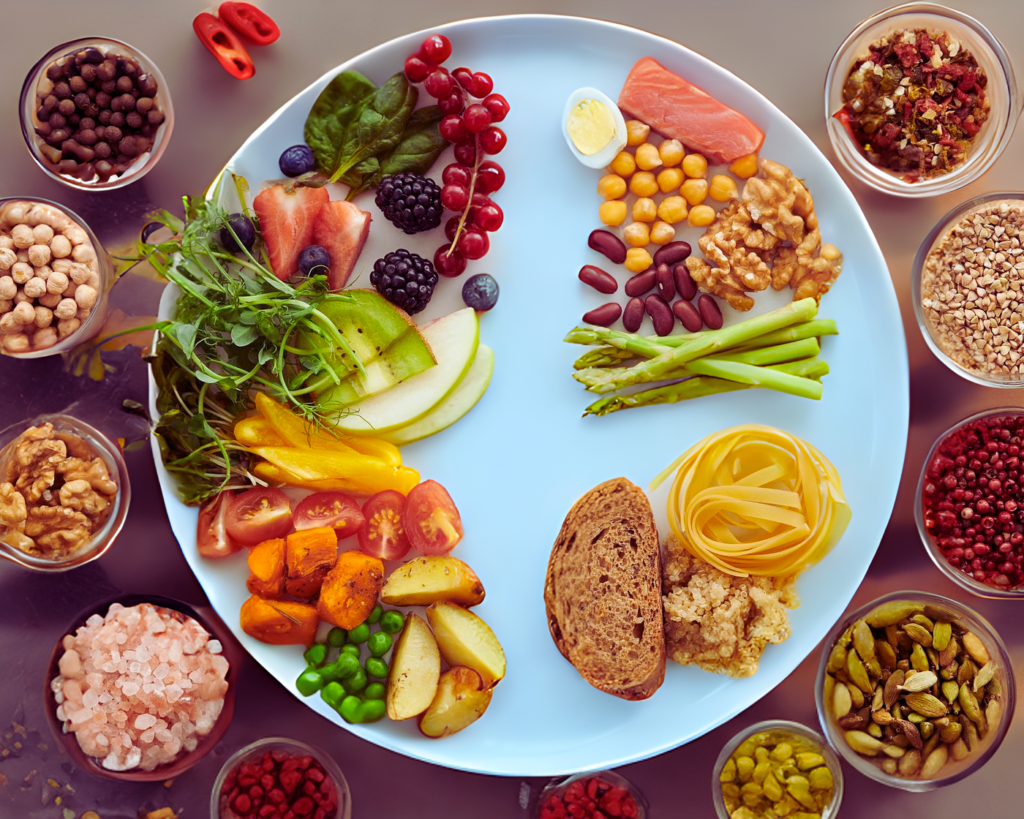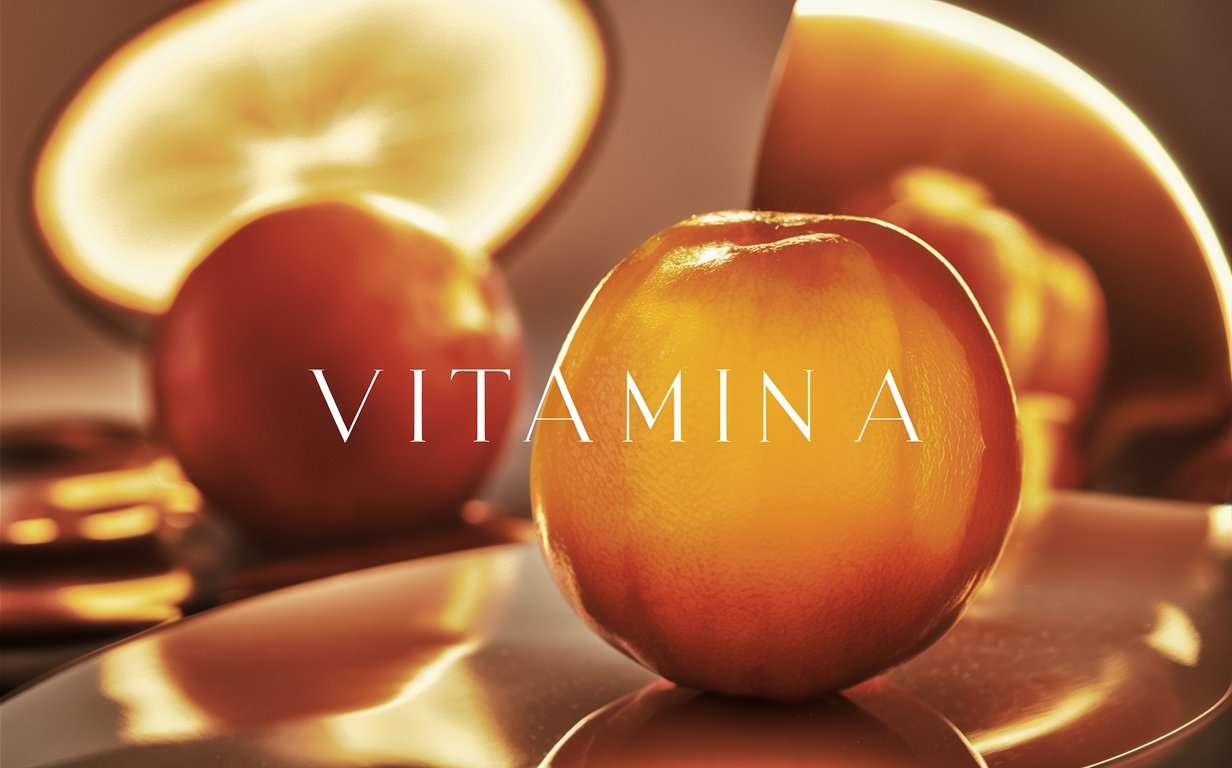Vitamins are vital organic compounds that our bodies need in trace quantities to keep functioning correctly. They are essential for several physiological functions, including as growth, immunity, and metabolism. Although many vitamins may be produced by human bodies, the majority need to be acquired from food or supplements.
There are two main types of vitamins: fat-soluble and water-soluble
1. Vitamins Soluble in Fat
- Vitamin A
- Vitamin C
- Vitamin D
- Vitamin E
- Vitamin K
Vitamin A: The Vision Protector – For eyes to remain healthy, particularly in low light, vitamin A is necessary. It assists in the production of rhodopsin, an eye pigment that enables night vision. This mega vitamin, which can be found in vibrant fruits and vegetables like mangoes, sweet potatoes, spinach, and carrots, also helps maintain healthy skin and a strong immune system.

Vitamin C: The Booster of Immunity – Vitamin C is an antioxidant that protects cells from damage and supports the body’s fight against infections. It is well known for its potent immune-boosting qualities.
– This mega vitamin, which is present in bell peppers, citrus fruits, strawberries, and kiwis, boosts immunity and fights off diseases like the flu and colds.
Vitamin D: The Bone Guardian – Because it facilitates the body’s absorption of calcium, a mineral necessary for bone strength and density, vitamin D is critical for sustaining bone health. Vitamin D, sometimes known as the “sunshine vitamin,” is produced by the skin in response to sunlight. Egg yolks, fatty fish, and fortified meals are further sources of it. This mega vitamin lowers the risk of chronic illnesses, enhances muscular function, and guards against bone disorders including osteoporosis.
Vitamin E: The Protector of Skin- Vitamin E functions as a potent antioxidant, shielding the skin from damage brought on by dangerous free radicals and outside elements like pollution and UV rays.
This powerful vitamin, which may be found in nuts, seeds, leafy greens, and vegetable oils, supports strong, healthy skin, hair, and nails. In addition to boosting immunity, vitamin E may lower the chance of developing chronic illnesses including cancer and heart disease.

Vitamin K: The Blood Clotting Agent- Vitamin K is essential for blood clotting, which helps the body stop bleeding after an injury. By assisting in the mineralization of bone tissue, it also benefits bone health.
Brussels sprouts, cabbage, and other vegetables are good providers of vitamin K, as are leafy greens like kale, spinach, and broccoli. This mega vitamin keeps the heart and bones healthy by ensuring adequate wound healing and assisting in the prevention of excessive bleeding.
In conclusion, vitamins are real superheroes in a disguise since they always operate in the background to maintain your strength and health. You can be sure you’re receiving all the vital vitamins your body needs to perform at its peak by include a variety of nutrient-rich foods in your diet. In order to unleash a healthier, happier version of yourself, embrace the power of these vitamin superheroes!
2. Vitamins Soluble in Water
Unlike fat-soluble vitamins, which are mostly kept in the body, these vitamins dissolve in water. The vitamins that are soluble in water include:
Ascorbic acid, or vitamin C: Essential for immunological response, wound healing, and collagen formation. Bell peppers, citrus fruits, strawberries, and leafy green vegetables all contain it.
B Vitamins
B Vitamins
- B1 (Thiamine)
- B2 (riboflavin)
- B3 (niacin)
- B5 (Pantothenic acid)
- B6 (Pyridoxine)
- B7 (biotin)
- B9 (Folate or Folic Acid)
- B12 (cobalamin)
There are many vitamins in this category, and each has a distinct purpose:
B1 (Thiamine): Essential for nerve function, energy metabolism, and the metabolism of carbohydrates. present in meat, beans, and whole grains.
B2 (riboflavin): Essential for the production of energy and the metabolism of steroids, lipids, and medications. Eggs, leafy green vegetables, and dairy products are examples of sources.
B3 (niacin): Necessary for DNA repair and energy metabolism. present in whole grains, beans, meat, and seafood.
B5 (Pantothenic acid): is necessary for the formation of coenzyme A, an enzyme that is involved in many different metabolic processes. It may be found in many different foods, including as veggies, whole grains, meat, and eggs.
B6 (Pyridoxine): Contributes to the breakdown of glycogen, the manufacture of neurotransmitters, and the metabolism of amino acids. Meat, seafood, nuts, and bananas are examples of sources.
B7 (biotin): Required for the synthesis of fatty acids, the metabolism of amino acids, and the synthesis of glucose. found in various vegetables, nuts, seeds, and egg yolks.
B9 (Folate or Folic Acid): Essential for cell division and DNA synthesis. Legumes, fortified cereals, and leafy green vegetables are some of the sources.
B12 (cobalamin): Necessary for DNA synthesis, brain function, and the production of red blood cells. found in foods derived from animals, such as dairy, fish, meat, and eggs.
Although vitamins are essential for good health, taking too much of them may be harmful. It’s essential to maintain a balanced diet to ensure an adequate intake of vitamins and other essential nutrients. If dietary intake is insufficient, supplements may be recommended under the guidance of a healthcare professional.
Top 10 Strategies for Daily Vitamin Intake: A Guide to Optimal Health and Well-Being
Maintaining your overall well-being and health depends on making sure you obtain enough vitamins each day. Here are some thorough pointers to assist you in doing this, organized into bullet points for easy reading:
1. Eat a Balanced Diet: Eat a range of foods high in nutrients from all the food categories, such as whole grains, fruits, vegetables, lean meats, and healthy fats. To make sure you’re receiving a variety of vitamins and minerals, try to eat a varied diet that includes a range of fruits and vegetables in various kinds and colors.
2. Prioritize whole Foods: Prioritize whole foods, less processed foods instead than refined and highly processed ones. Compared to processed foods, which may lose certain nutrients after processing, whole foods maintain more of their nutritional value.

3. Incorporate a Range of Fruits and Vegetables: Diverse fruits and vegetables have particular ratios of minerals and vitamins. For a wide range of nutrients, make sure your meals and snacks include a mix of vibrant fruits and vegetables.
4. Select Lean Proteins: Pick lean protein sources such fish, chicken, tofu, beans, lentils, and nuts.
Foods high in protein provide vital amino acids and other nutrients needed for maintaining muscular mass and overall good health.
5. Select Whole Grains: Choose whole grains such whole wheat bread and pasta, brown rice, quinoa, oats, and barley. B vitamins, fiber, and minerals such as iron and magnesium are abundant in whole grains and are critical for the body’s ability to produce energy and maintain general health.
6. Include Healthy Fats: Include foods high in avocados, nuts, seeds, olive oil, and fatty fish like mackerel and salmon in your diet. Absorption of fat-soluble vitamins (such A, D, E, and K) and maintenance of brain function depend on healthy fats.
7. Read Food Labels: When buying packaged goods, be sure to read the nutrition labels.
Seek for goods that are low in salt, harmful fats, and added sugars and rich in vitamins and minerals.

8. Consider Supplementation: If your diet isn’t enough to satisfy your requirements for certain nutrients or you have certain dietary limitations, you may want to take a daily multivitamin or individual vitamin supplements as directed by a medical practitioner. A balanced diet should be supplemented, not substituted, with supplements.
9. Remain Hydrated: To promote general health and the absorption of nutrients, sip on plenty of water throughout the day. Water is essential for the body’s removal of waste materials and the transportation of nutrients to cells.

10. Monitor Your Intake: Make sure you’re getting enough nutrients by keeping a food journal or using a smartphone app to monitor what you eat.
See a qualified dietician or other healthcare professional for individualized advice if you have any particular health objectives or concerns.
Top 10 Kid-Friendly Vitamin-Rich Foods for Healthy Growth and Development
In order to promote maximum health and well-being, you may make sure you’re receiving enough vitamins and minerals each day by implementing these suggestions and maintaining a diverse and balanced diet.
Yes, here are ten foods high in vitamins that kids will like, listed in bullet points with a chart for simple comparison:
1. Spinach: Rich in iron, folate, vitamin K, vitamin C, and vitamin A.
Blends well into omelets, pasta meals, smoothies, and sandwiches.
2. Sweet potatoes: High in fiber, potassium, vitamin C, and vitamin A.
Prepare delicious mashed potatoes, roasted sweet potato cubes, or baked sweet potato fries.
3. Oranges: rich in fiber, potassium, and vitamin C.
Use them to produce freshly squeezed orange juice, or serve as a cool snack.
4. Yogurt: includes probiotics, calcium, vitamin D, and protein.
Serve plain yogurt as a healthy breakfast or snack choice, along with fruit or honey.
5. Eggs: an excellent source of choline, vitamin B12, vitamin D, and protein.
For a high-protein supper, serve hard-boiled eggs, scrambled eggs, or egg muffins.
6. Salmon: Rich in protein, vitamin D, and omega-3 fatty acids.
Make salmon sushi rolls, salmon burgers, or baked or grilled salmon fillets.
7. Berries: rich in fiber, antioxidants, and vitamin C.
For a tasty and healthy treat, mix fresh berries into fruit salads, yogurt, smoothies, and oatmeal.
8. Broccoli: High in fiber, folate, vitamin K, and vitamin C.
Broccoli may be used to spaghetti, stir-fries, casseroles, or served as a side dish when steamed or roasted.
9. Almonds: a rich source of protein, healthy fats, magnesium, and vitamin E.
Serve whole almonds as a snack or cut them into slices for yogurt parfaits, salads, and porridge.
10. Root vegetables: Rich in fiber, vitamin K, and vitamin A.
Serve raw carrot sticks together peanut butter or hummus to create a crisp and wholesome snack.
| Food | Vitamins | Benefits | Serving Ideas |
| Spinach | Vitamin A, Vitamin C, Vitamin K, Folate, Iron | Supports vision, immune function, and bone health | Smoothies, omelets, pasta dishes, sandwiches |
| Sweet Potatoes | Vitamin A, Vitamin C, Potassium, Fiber | Supports vision, immune function, and brain health | Baked sweet potato fries, mashed sweet potatoes, roasted sweet potato cubes |
| Oranges | Vitamin C, Potassium, Fiber | Supports immune function and digestive health | Freshly squeezed orange juice, orange slices |
| Yogurt | Calcium, Vitamin D, Protein, Probiotics | Supports bone health, immune function, and gut health | Plain yogurt with fruit, yogurt smoothies, yogurt parfaits |
| Eggs | Vitamin D, Vitamin B12, Protein, Choline | Supports bone health, brain function, and energy levels | Scrambled eggs, hard-boiled eggs, egg muffins |
| Salmon | Omega-3 Fatty Acids, Vitamin D, Protein | Supports heart health, brain function, and eye health | Grilled or baked salmon fillets, salmon burgers, salmon sushi rolls |
| Berries | Vitamin C, Antioxidants, Fiber | Supports immune function, brain health, and digestive health | Add to oatmeal, yogurt, smoothies, or fruit, salads |
| Broccoli | Vitamin C, Vitamin K, Folate, Fiber | Supports immune function, bone health, and digestion | Steamed or roasted broccoli, add to pasta, stir-fries, or casseroles |
| Almonds | Vitamin E, Magnesium, | Supports skin health, heart health, and | Whole almonds as a snack, add sliced almonds to |
| Protein, Healthy Fats | brain function | oatmeal, salads, or yogurt parfaits | |
| Carrots | Vitamin A, Vitamin K, Fiber | Supports vision, immune function, and digestive health | Raw carrot sticks with hummus or peanut butter, add to salads or stir-fries |
| Broccoli | Vitamin C, Vitamin K, | Supports immune function, bone health, | Steamed or roasted broccoli, add to pasta, |
Frequently Asked Questions:
- Question: What are some signs that indicate a need for supplementation due to an insufficient diet?
Answer: Signs such as fatigue, frequent illness, brittle nails, and hair loss may indicate a need for supplementation due to an inadequate diet. - Question: How can I determine if I have specific dietary limitations that may require supplementation?
Answer: Consulting a healthcare professional or a registered dietitian can help determine specific dietary limitations that may necessitate supplementation based on individual health conditions or lifestyle choices. - Question: Are there any risks associated with taking supplements, and how can I mitigate these risks?
Answer: Risks associated with supplements include overdose, interactions with medications, and potential adverse effects. To mitigate these risks, it’s crucial to follow recommended dosages, consult healthcare providers before starting any new supplement regimen, and choose reputable brands with third-party testing for quality and purity.













3 Responses
I appreciate that you can guide people through your articles on how to live a healthy lifestyle.
I’m grateful for the time and effort you put into writing such a compelling piece
Outstanding